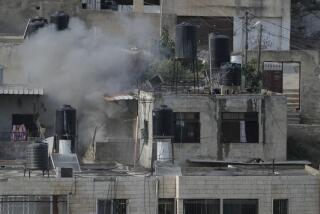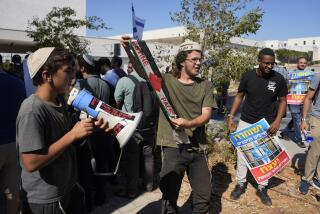After Riots, Egypt Faces Future Woe : Troubles With Trade, Tourism
CAIRO — The world seems to be closing in on Egyptian President Hosni Mubarak. Terrorism, student demonstrations and a bloody mutiny by the Central Security Forces have rocked the country in the past few months.
Diplomats and Egyptians agree that Mubarak handled the mutiny uncharacteristically well but it raises serious questions about the future, particularly the regime’s relationship with the army.
Since Mubarak assumed office after the 1982 assassination of Anwar Sadat, he has tried to balance his legitimacy on four domestic and foreign policy pillars.
Abroad, he has pursued the not always compatible objectives of lessening Egypt’s post-Camp David isolation in the Arab world while trying to preserve a pivotal role in the search for comprehensive Middle East peace. At home, he has tried to address mounting economic problems ignored or mishandled by his predecessors while permitting greater intellectual and political freedom.
Everyone gives Mubarak high marks for effort but he has not succeeded in the first three endeavors and is, as a result, under mounting pressure to back-pedal on the fourth.
Indeed, the recent rioting by some 17,000 conscripts of the Security Forces has increased fears that Mubarak, under pressure from the military, may be forced to crack down on dissent, particularly on the lively opposition press he allowed to emerge as part of his policy of “democratic openness.”
“Until recently, Mubarak saw this freedom as an asset for the regime,” said Mohammed Sid Ahmed recently, an editor with the left-wing newspaper Al Ahali. “But now he is beginning to question whether it isn’t a liability. . . . For Mubarak, the value of an opposition press is based on the extent to which it can contain forces, not unleash them.”
Precisely what was unleashed during the police mutiny is the subject of an intense debate now building here.
Were the riots organized and carried out according to a plan, as suggested by the speed with which they quickly spread from a Security Forces camp near the Pyramids to at least five other bases in Cairo and three provincial cities? Was the aim to overthrow the government, either by creating a pretext for a military coup or by rendering inoperative the 282,000 men of the Security Forces who serve as an important counterweight to the army?
In the wake of the rioting, shadowy conspiracy theories abound, rising from among the ashes of Cairo’s burnt-out nightclubs and luxury hotels. The army was called on to quell the unrest, in which at least 107 people were killed and 719 injured. Maj. Gen. Zaki Badr, Egypt’s new and reportedly much-feared interior minister, has pointed the finger at the usual suspects--Islamic fundamentalists and leftists. He told reporters he had evidence of previous attempts by Muslim extremists and other groups to penetrate the Security Forces.
Information Minister Safwat Sharif added that some of the conscripts, men paid only $4.50 a month, had the equivalent of $37 in their pockets when captured.
Mubarak, in a speech to Parliament, blamed the riots on “deviationists” in the Security Forces and other “outlaws,” declining to make more specific accusations until the government’s investigation is over. He appeared, however, to acknowledge that the conscripts’ standard of living may have been a factor by conceding that they perform under “difficult conditions” he promised to improve.
Indeed, most diplomats and Egyptian analysts say they see the rioting less in terms of a conspiracy against the state than as as a long-overdue uprising against the prison-like conditions in which conscripts live.
“The basic problem,” a Western military source said, “is that these guys are treated like animals.”
Bivouacked in shabby tents on the desert surrounding the city, the conscripts--more than 70,000 of them reportedly based in the Cairo area--are delivered every day by truck to their posts in front of embassies, hotels and government buildings. Guard duty and transportation back and forth often add up to a 16-hour day. As compensation, they receive two meals of beans and wages that average less than two cents an hour.
Discipline is harsh; conscripts caught slouching on guard duty are beaten with sticks. And the officers have a reputation for arrogance and brutality. “The quality of their officer corps is very low, much lower than in the army,” a Western diplomat said.
The diplomat would not rule out the possibility of a conspiracy but he believes the rioting spread as a “spontaneous combustion” amid accumulated grievances. Among the alleged grievances was a complaint that the conscripts had not been paid for two months.
Moreover, there was word, circulated in the camps a few days before the mutiny, that the term of service for conscripts with bad behavior records was to be extended from three years to four. The government later denied it but did acknowledge that the “rumor” helped to spark the riots.
The mutiny went on for three days. The conscripts burned to the ground three luxury hotels near the Pyramids and stormed a prison to free 1,200 inmates--many of whom are still at large. It was the worst violence in Egypt since 1977, when riots followed an attempt to raise the price of subsidized foods. In many ways, the new violence was worse, not only because the death toll was higher but because it was the people entrusted with enforcing the law who broke it.
Still, if the government was shaken by what happened it was able to find encouragement in what did not happen. Among the things that did not happen, despite fears to the contrary:
--The rioting initially showed signs of spreading to the civilian sector and fusing grievances shared by the poor and the religious, but it did not spread far into those sectors.
--There was little looting and no noticeable increase in other crimes. Most Egyptians obeyed the curfew declared the morning after the mutiny and cheered on the army forces rolling past their windows.
“Imagine what would happen in cities like New York or Los Angeles if the police force was suddenly rendered inoperative,” one analyst said.
--Most important perhaps, Mubarak did not botch the management of this crisis; in acting quickly and decisively to call in the army and snuff out the rioting, he projected a new image of confidence and strength.
“The president radiated credibility and forcefulness,” said Ali Hillal Dessouki, a Cairo University political scientist. “What happened was a definite setback to the regime. But if the regime is weaker, the president is stronger.”
This is important because almost nothing else has been going right for Mubarak recently.
On the diplomatic front, Egypt’s strategy for winning back friends and influence in the Arab world went awry last month when King Hussein of Jordan, his patience exhausted, walked out of an agreement with the PLO to seek joint peace negotiations with Israel.
On the domestic front, Mubarak’s main problem is the economy. Over the past year, Egypt has seen its foreign debt swell to more than $31 billion while its main sources of hard currency have all contracted. Remittances from the 3 million Egyptians working in the Persian Gulf area declined from $4 billion to $3.75 billion last year and are expected to drop sharply this year as many workers are sent home.
More disastrously, Egypt’s oil earnings have nose-dived with the fall of prices. Oil sales accounted for nearly $3 billion in revenues in 1984 but may not even bring in half as much this year, economic analysts say.
Even before the riots, revenues from tourism were expected to be off by as much as 30% after last year’s back-to-back terrorist attacks--the hijacking of the Italian cruise ship Achille Lauro off Egypt in October and the hijacking of an Egyptair airliner to Malta the following month.
Ticking off the setbacks, a U.S. diplomat estimated recently that Egypt’s foreign currency earnings will fall by as much as $5 billion this year, a blow that Western economists say will force Egypt to seek rescheduling of its major debts.
If that happens, economists say the government will have to implement drastic economic reforms, including the elimination of subsidies that account for a third of the national budget and a devaluation of the Egyptian pound. These actions have long been advocated by the International Monetary Fund and other international lending institutions.
This raises the specter of more domestic unrest at a time when the security forces cannot be counted upon to contain it.
“The government’s dilemma,” a Western diplomat said, “is that economic reform, which they have been reluctant to undertake before because of the fear of domestic unrest, looks even more dangerous now. Yet if they wait, the outcome is likely to be disaster.”
Another concern is the position of the army and its 315,000 men. Some senior officers are said to feel that Mubarak is allowing the opposition too much freedom to complain about the government at a time when there is much to complain about.
If push came to shove, Mubarak’s likely successor would be Abdel Halim Abu Ghazala, the defense minister and army chief of staff. Abu Ghazala kept a low profile during the police mutiny; although he commanded the troops that put down the rioting, no public statements were issued in his name and he was conspicuously absent from the entourage that accompanied Mubarak on a tour of riot-damaged areas.
This was seen as confirmation of Abu Ghazala’s loyalty to the president, but a number of diplomats said privately that his need to absent himself from the limelight is also a sign of the pressure both men are under.
This pressure contributes to the concern, expressed by a number of sources, that Mubarak will be forced eventually to narrow some of the democratic openings he has created--or give way to someone who will.
For the moment, however, the president has refused to do this. Calling democracy “the solid pyramid of our life,” Mubarak pledged in his address to Parliament to proceed with democratic reforms while continuing to seek solutions to Egypt’s economic problems.
“One must give him an A-plus for persistence,” one analyst said, noting that Mubarak is also dispatching a special delegation to the United States next week--a mission to promote tourism in Egypt.
More to Read
Sign up for Essential California
The most important California stories and recommendations in your inbox every morning.
You may occasionally receive promotional content from the Los Angeles Times.










